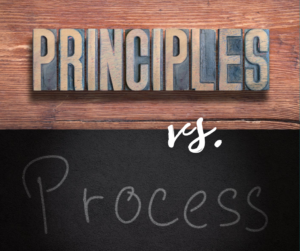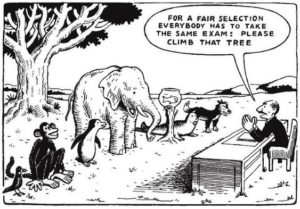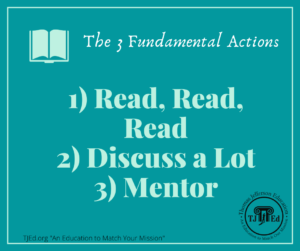by Ian Cox
Let me give away the ending right now and share The 3 Fundamental Actions of the TJEd process: read, read, read; discuss a lot; and mentor. That’s the TJEd process. Really. It’s as simple as that.
At the core of everything (The 7 Keys of Great Teaching, the Phases of Learning, the 55 Ingredients, the 4 Years of Scholar Phase, the different Missions, the 5 Mentoring Environments, etc.) are these 3 Fundamental Actions: read, read, read; discuss a lot; and mentor. This is why you may be asking, “I resonate with the TJEd philosophy, but how do I actually do it?” It’s so simple that we think it can’t possibly be the answer. At least, I didn’t think it was the real answer for years.

Principles vs. Process
Let me explain a little of why it’s hard to give specific “dos” and “don’ts” within the TJEd system. Children change a lot. It seems each month they morph into some new creature—yes, I think “creature” is the proper term here. And sometimes it seems to happen from day to day! But, in general, look at the drastic changes from 0-8, 9-12, 13-18, 19-26, 27-40, and beyond. One size cannot fit everyone.
First off, culture, goals, filling of gaps, assignments, breaks, environment, etc., really is different. And second, it actually should be different for each family and individual and at different times in their life. Sometimes what is needed is to back off and cool it. Sometimes it’s to put the pressure on. Sometimes it’s to utilize an outside mentor, do an internship, or do intensive personal study.
Each individual is unique. Each individual has a special purpose in life, a mission—be it grand and lauded or simple and subtle.
If we at TJEd profess to help each individual gain an education to match their unique mission, how can we give a specific regimen for all? If you are a  fish, must we require you to learn to climb trees? If I can continue this fun analogy a little further than I probably should….what if I, as a monkey, have learned to be a good monkey? Striving even to become a great monkey! The principles governing this process will be similar for you—as a fish, remember—to become the best fish you can possibly be. The principles and general rules tend to apply in whatever sector of mastery each individual seeks. This is the role of a mentor and parent: not to have the same mastery, but to be striving for excellence. So, we don’t want to turn you into a monkey, rather, we want to help you become a superb fish! (I sure hope you like fish!)
fish, must we require you to learn to climb trees? If I can continue this fun analogy a little further than I probably should….what if I, as a monkey, have learned to be a good monkey? Striving even to become a great monkey! The principles governing this process will be similar for you—as a fish, remember—to become the best fish you can possibly be. The principles and general rules tend to apply in whatever sector of mastery each individual seeks. This is the role of a mentor and parent: not to have the same mastery, but to be striving for excellence. So, we don’t want to turn you into a monkey, rather, we want to help you become a superb fish! (I sure hope you like fish!)
The specifics for you could be very different from mine. And that’s ok.
However, the general principles still apply—which is why when TJEd mentors are asked a question they often respond with questions about you and the situation. Once we have a general understanding of your specific case, we are able to give suggestions on how to apply the principles.
Maybe your teen doesn’t read because they need more snuggle time with mom and dad. Maybe they are burnt out and need a break. Maybe it’s because they actually need a really big, audacious assignment. Maybe they don’t have enough responsibility and are rebelling. Maybe they need to check their diet and sleep. Maybe they need an outside mentor to really challenge and inspire them. Maybe it’s just not the time for an answer yet and you get to keep seeking…or waiting. The potential scenarios are, virtually, infinite.
Guide vs. Expert
The TJEd mentors have experience with the principles and the general rules of great education, but we never assume to be the experts of your family. That right is reserved to you in the context of your particular, specific, unique family. We develop our mentoring services and programs around this fundamental belief. We are guides. And our services are not “all-encompassing,” but rather they are geared towards getting you acquainted with the principles so that you can continue the process and gain mastery in them.
Brand-new TJEders tend to do great with this process. And then the slump hits. (I know this from experience, this has been me several times over now.) They are off the beaten path of the well-systematized one-size-fits-all conveyor-belt approach. They begin to wonder how it is all done. They’re
excited and intrigued about this new system, this new “plan.” It’s shiny and new! But the conveyor belt hangover creeps up and then, KABLOOEY! Their plans get torn to shreds by a change in…. anything. Pick one of those infinite scenarios listed earlier. Battle plans never make it past first contact. The demand for something to change comes rushing in and we fly the white flag and head for the conveyor-belt hills! At least that has often been my gut-reaction.
At this point in many homeschoolers’ journey, they start searching for answers. They seek help. They purchase this or that curriculum and/or enroll in some “how-to course.” They join a charter school or a co-op organization. Please, don’t get me wrong here; each of these resources, trainings, institutions, etc. can be really great and might be the right thing for a particular family during a particular time. However, if the heart and the mind are not properly centered on your ideals—and in the principles that lead to achieving them—then these wonderful opportunities can actually distract and may even damage the result you’re truly after.
…I interrupt this broadcast because this brings up a really, really important question. What are we after? Why education at all—not to mention a leadership education? This is a critical question to answer for yourself and with your family. Let me share a few of the central points of TJEd:
-
- Every student has areas of inner genius and/or potential greatness.
- The purpose of education is to help the student detect and develop their inner genius, along with obtaining general knowledge and skills that will be helpful in the student’s life and help the student to flourish personally and improve society through dedicated service.
- Students typically find their areas of genius by pursuing studies they are passionate about.
Keep thinking and discussing this question until you feel like you fully understand it. Visit the TJEd Facebook discussion group. Talk to your friends. Email me or the other TJEd mentors. And now, back to our regular programming…
At TJEd we are always weighing the issue: Principle vs. Process.
If we had to choose only one, it would be principles, hands down. These are hard to package neatly and sell. But in the end, principles work. If all we did was detailed training, you would get a cool certificate in something, but you wouldn’t become an expert in your own right. You would know stuff we told you to know, but might you own most of it? What if something comes up that we didn’t teach you? What then?
Our whole purpose at TJEd is to help you become your own expert. Well, actually, that’s your role already; our Creator endowed you with that from the beginning. We’re here to help you obtain the education needed to successfully and confidently apply your endowed expertise.
Dependent vs. Independent
At this point, it doesn’t matter what happens in the world. It doesn’t matter what Grandpa says or doesn’t say. It doesn’t matter what the neighbors think. It won’t matter what the media touts. You don’t have to know, far in advance, what Johnny or Sally will need at any given point in time. You will know, for yourself, what to do and when. Now, this isn’t to say you will know every possible answer for every possible situation. What I am saying is you will know the process of how to know.
This often comes with the help and support of outside counsel. Note that there are two extremes here being governed by a very important principle. It is the proper mixture of dependence and independence.
Because you know how to know, how to seek and obtain your own answers, you are independent. Not a dependent. Does that make sense? If it doesn’t please reach out to us! This is one of the leading points: master the principles and you’ll be free. We want, and even need at times, to use outside experts, organizations, curricula, programs, etc. but only in their proper place: as guides, tools, and aids….and that is not to replace you as the expert of your own home. Or to render you dependent, edging you away from becoming a great fish.
It’s your family. We urge you not to forfeit it to someone else.
The 3 Fundamental Actions
To be your own expert, you must know and understand the principles of great leadership education. Then, you’ll be able to face any challenge  successfully as a family. It’s a process, yes. It takes time and effort to discover and gain mastery—just like in anything. However, it is a simple process and very doable. This is why this answer was so evasive to me for so many years. I would enjoy the classics and the discussion, but then I’d push back from time to time wondering, “When are we going to learn how to actually do it, though?”
successfully as a family. It’s a process, yes. It takes time and effort to discover and gain mastery—just like in anything. However, it is a simple process and very doable. This is why this answer was so evasive to me for so many years. I would enjoy the classics and the discussion, but then I’d push back from time to time wondering, “When are we going to learn how to actually do it, though?”
My conveyor belt roots had a much deeper hold than I thought—and I was actually homeschooled through high school. The process of mentoring and living a mission-driven life was still a bit foreign to me. Serving, sacrificing, working hard and the example of parents and siblings were all there. Yet, there was something more that was hazy. I couldn’t quite make it out. How does one actually do it?!
After discussing with thousands of families from all over the world I’ve started seeing a pattern. Tolstoy helped me put words to it:
Happy families are all alike; every unhappy family is unhappy in its own way.
When families consistently applied the 3 Fundamental Actions in their homes they tend to gain an understanding of the principles and flourish.
When they were reading, reading, reading; discussing a lot; and getting mentoring, alongside whatever supplements of curriculum and organizations—or not—they deemed necessary at the time, it made for a highly effective learning environment. TJEd High! for Johnny, a geology curriculum or program for Sally and a training for Mom and Dad can add extra insights, tools, and needed support to accomplish the family’s purposes. It’s not about one organization or program. It becomes family focused while drawing on the resources available for filling needs and gaps. Besides: how tough is it to read and discuss together as a family? The simplest solutions really do tend to be the most powerful answers. Plus, it’s fun and it builds the family in myriad other ways.
We mustn’t sacrifice our family on the altar of some curriculum or institution.
Becoming your own expert is nothing to fear or stress over—especially if you don’t do it alone. There is no need to attempt it alone. Think of it this

way: what is the fastest way through deep snow? In the footprints of someone who has made it through. This reiterates that there are governing principles and general rules that will safely, simply, and even easily and quickly guide you through the path of a great education.
Keep this in mind as you continue your journey. TJEd is less concerned about teaching you which color to paint where. Yes, it takes longer to learn to be a proficient artist than it does to color by number. But isn’t it worth it in the end?! Don’t you want to be a great fish?! Hahaha, ok, ok, I’ll try and not call you a fish anymore. Maybe you’re a turtle, a hare, a cheetah, or a bison. Whatever great animal you might be, when you become a master artist, designer, manager, philanthropist, accountant, etc., with wisdom rooted in principles, you begin to intuitively create with new brushes and colors or use the old ones in new ways. The challenges become exhilarating! (Granted, if you have little children it might be a drowsy exhilaration.) They become works of art! A part of your journey tapestry.
You end up actually changing the world: by feeding the hungry or promoting truth, maybe liberating the captive, spreading beauty, healing the sick, comforting the lonely— whatever it is you, as a genius, were created for.
You humbly join the masters, the greats, the heroes and heroines of the past and present. You raise future George Washingtons, Madame Curies, Victor Frankls, Joans of Arc, Frederick Douglass’, Esthers, Cincinnatis, Margaret Thatchers, Shakespeares, Thomas Jeffersons, and Abigail Adams’.

I invite you to trust the process and consistently apply the 3 Fundamental Actions:
- Read, Read, Read
- Discuss a lot
- Mentor
The TJEd Process
A Step-by-Step Guide for TJEders
Part 1: Process vs. Principles & The 3 Fundamental Actions
Part 2: The Resources & First Steps of Application (Coming Soon)
Part 3: The TJEd Books: Order, Overview, and Notes (Coming Soon)
Part 4: The TJEd Mentoring Services: Which is right for me? How can I utilize mine the best? (Coming Soon)
Part 5: Principle-Centered Mentoring (Coming Soon)
































Leave A Comment